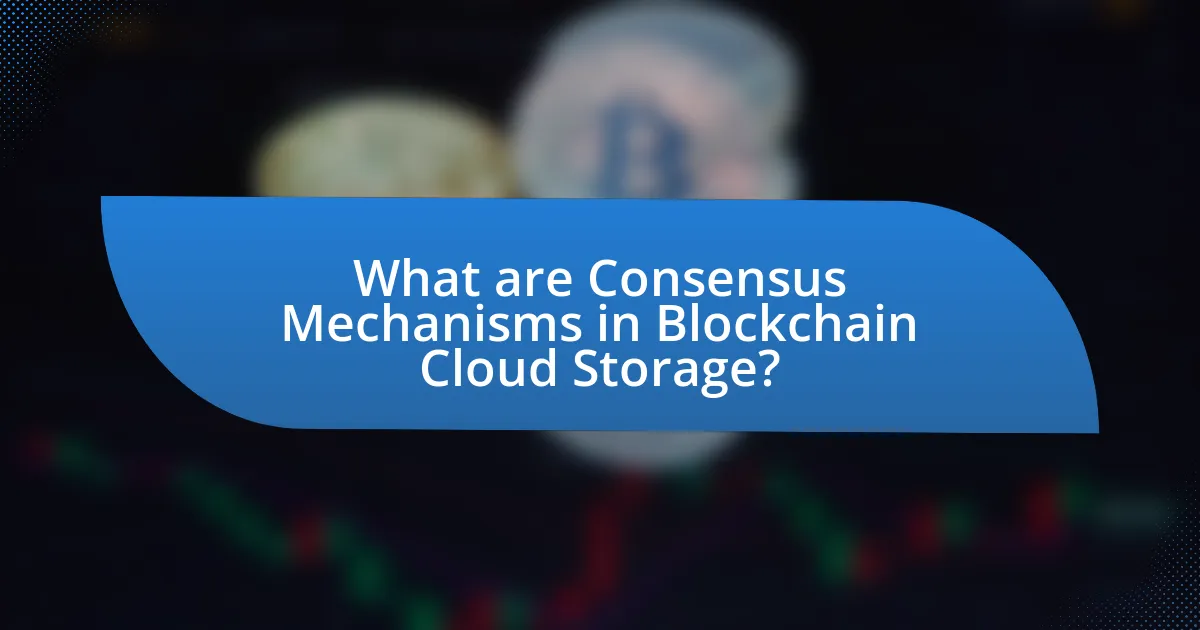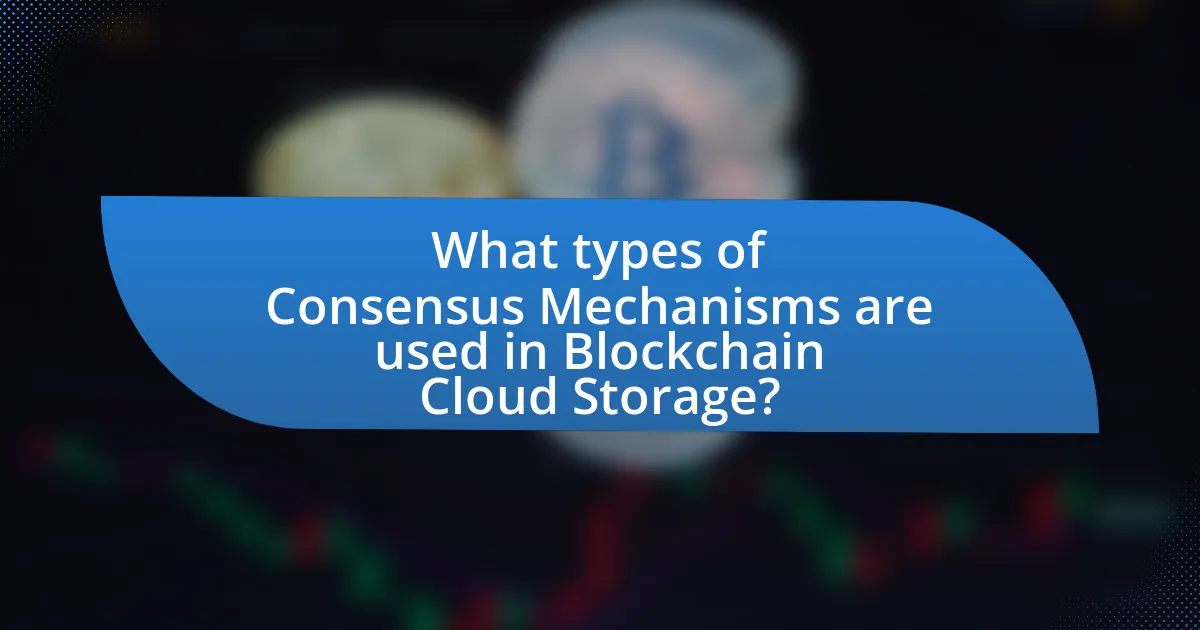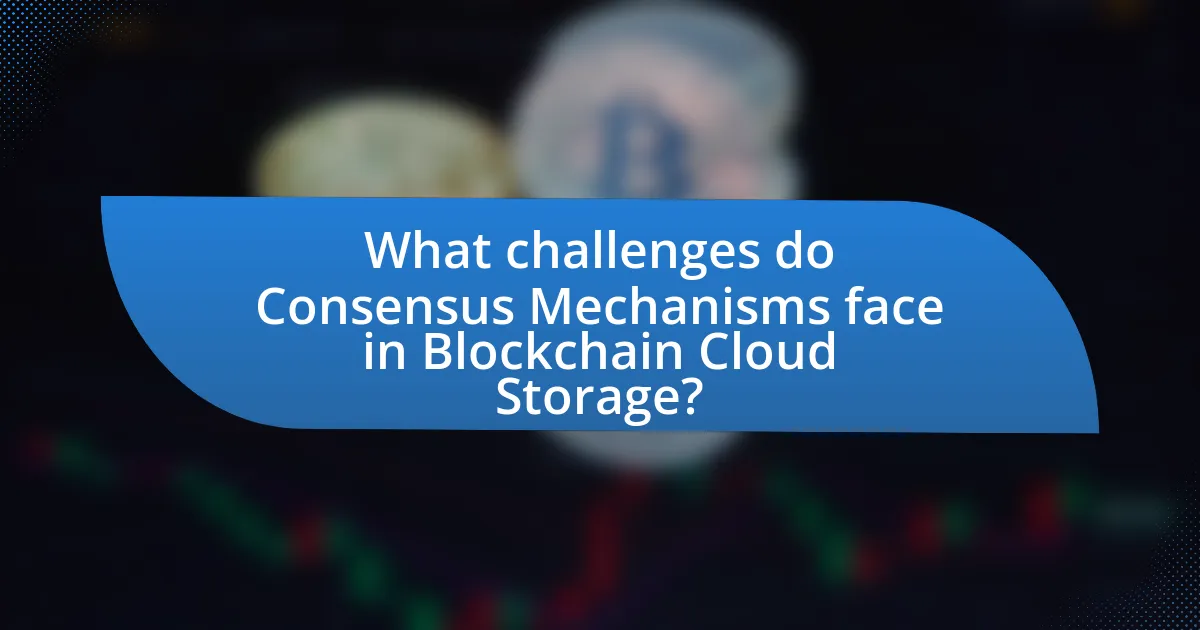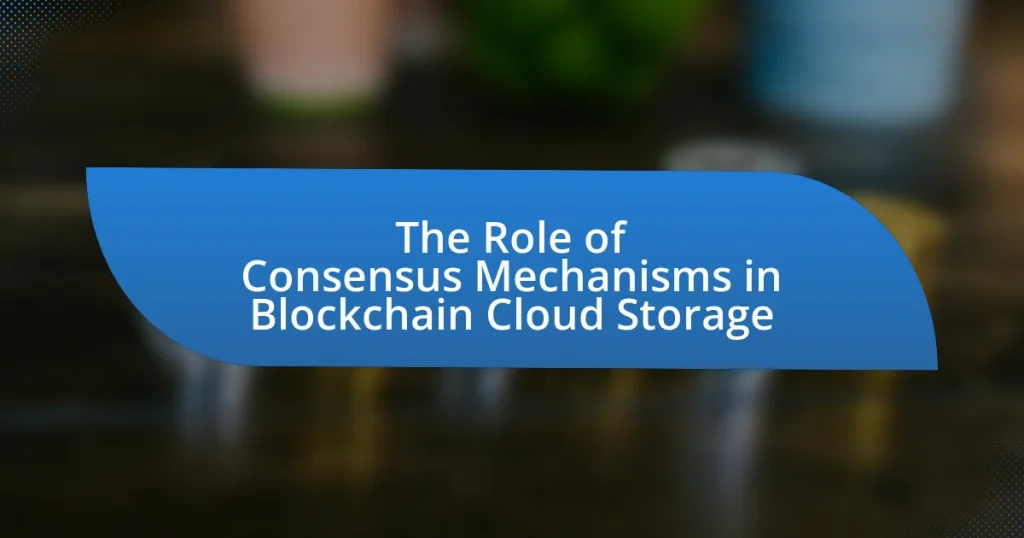Consensus mechanisms are critical protocols in blockchain cloud storage that ensure all network participants agree on the state of stored data, thereby maintaining data integrity and security. This article explores various consensus mechanisms, including Proof of Work, Proof of Stake, and Delegated Proof of Stake, detailing their functions, key components, and the challenges they face, such as scalability and energy consumption. Additionally, it examines how these mechanisms enhance data integrity, prevent unauthorized alterations, and the trade-offs between security and speed. The discussion also highlights innovations and best practices for implementing effective consensus mechanisms in blockchain cloud storage systems.

What are Consensus Mechanisms in Blockchain Cloud Storage?
Consensus mechanisms in blockchain cloud storage are protocols that ensure all participants in the network agree on the state of the data stored. These mechanisms, such as Proof of Work and Proof of Stake, validate transactions and maintain the integrity of the distributed ledger. They are essential for preventing data tampering and ensuring that all copies of the data across the network are consistent and trustworthy. For instance, in a decentralized storage system, consensus mechanisms help to confirm that data is accurately stored and retrieved, thereby enhancing security and reliability.
How do Consensus Mechanisms function within Blockchain Cloud Storage?
Consensus mechanisms in blockchain cloud storage ensure data integrity and security by validating transactions and maintaining a consistent state across distributed nodes. These mechanisms, such as Proof of Work or Proof of Stake, require participants to reach an agreement on the validity of transactions before they are added to the blockchain. This process prevents unauthorized data alterations and ensures that all copies of the stored data are synchronized. For instance, in a decentralized storage system, when a user uploads data, the consensus mechanism verifies the transaction, ensuring that it is legitimate and that the data is stored correctly across the network. This validation process is crucial for maintaining trust and reliability in blockchain cloud storage solutions.
What are the key components of Consensus Mechanisms?
The key components of consensus mechanisms include validation, agreement, and security. Validation ensures that transactions are verified by participants in the network, typically through cryptographic methods. Agreement refers to the process by which all nodes in the network reach a consensus on the state of the blockchain, often achieved through protocols like Proof of Work or Proof of Stake. Security encompasses the measures taken to protect the network from attacks and ensure the integrity of the data, which is critical for maintaining trust among participants. These components work together to facilitate reliable and decentralized decision-making in blockchain systems.
How do these components interact in Blockchain Cloud Storage?
In Blockchain Cloud Storage, components such as decentralized storage nodes, consensus mechanisms, and smart contracts interact to ensure data integrity, availability, and security. Decentralized storage nodes store data across a distributed network, while consensus mechanisms validate transactions and maintain a consistent state of the blockchain. Smart contracts automate processes and enforce agreements between users and storage providers. This interaction creates a robust system where data is securely stored, verified, and accessible, minimizing the risk of data loss or tampering. For instance, the use of Proof of Stake as a consensus mechanism allows nodes to validate transactions based on their stake, enhancing efficiency and reducing energy consumption compared to traditional methods.
Why are Consensus Mechanisms essential for Blockchain Cloud Storage?
Consensus mechanisms are essential for blockchain cloud storage because they ensure data integrity and security through decentralized validation. By requiring multiple nodes to agree on the validity of transactions, consensus mechanisms prevent unauthorized access and data tampering. For instance, in a blockchain network using Proof of Work, miners must solve complex mathematical problems to validate transactions, which adds a layer of security and makes it computationally expensive for malicious actors to alter data. This decentralized approach not only enhances trust among users but also improves the reliability of data storage solutions, as evidenced by the increasing adoption of blockchain technology in various sectors for secure data management.
What security benefits do Consensus Mechanisms provide?
Consensus mechanisms provide enhanced security by ensuring that all participants in a blockchain network agree on the validity of transactions before they are added to the ledger. This agreement prevents double-spending and unauthorized alterations, as any attempt to change a transaction would require the consensus of the majority of nodes in the network. For instance, in Proof of Work systems, the computational effort required to alter a block makes such attacks economically unfeasible. Additionally, consensus mechanisms like Proof of Stake further enhance security by aligning the interests of validators with the integrity of the network, as they risk losing their staked assets if they act maliciously. These mechanisms collectively create a robust defense against fraud and attacks, thereby securing the integrity of blockchain cloud storage systems.
How do Consensus Mechanisms enhance data integrity?
Consensus mechanisms enhance data integrity by ensuring that all participants in a blockchain network agree on the validity of transactions before they are recorded. This agreement process prevents unauthorized changes and ensures that only verified data is added to the blockchain. For instance, in Proof of Work, miners must solve complex mathematical problems to validate transactions, which requires significant computational effort, thereby deterring malicious activities. Additionally, in Proof of Stake, validators are incentivized to act honestly since their stake is at risk. These mechanisms create a trustless environment where data integrity is maintained through collective agreement and verification, reducing the likelihood of fraud or data tampering.

What types of Consensus Mechanisms are used in Blockchain Cloud Storage?
Blockchain cloud storage utilizes several types of consensus mechanisms, including Proof of Work (PoW), Proof of Stake (PoS), and Delegated Proof of Stake (DPoS). Proof of Work requires participants to solve complex mathematical problems to validate transactions, ensuring security but consuming significant energy. Proof of Stake allows validators to create new blocks based on the number of coins they hold and are willing to “stake,” promoting energy efficiency. Delegated Proof of Stake involves stakeholders voting for a small number of delegates to validate transactions on their behalf, enhancing scalability and speed. These mechanisms are essential for maintaining data integrity and security in decentralized storage systems.
What are the most common Consensus Mechanisms in this context?
The most common consensus mechanisms in the context of blockchain cloud storage are Proof of Work (PoW), Proof of Stake (PoS), and Delegated Proof of Stake (DPoS). PoW, utilized by Bitcoin, requires miners to solve complex mathematical problems to validate transactions, ensuring network security but consuming significant energy. PoS, adopted by networks like Ethereum 2.0, allows validators to create new blocks based on the number of coins they hold and are willing to “stake,” promoting energy efficiency. DPoS, used by platforms such as EOS, involves stakeholders voting for a small number of delegates to validate transactions, enhancing scalability and speed. These mechanisms are essential for maintaining data integrity and trust in decentralized cloud storage systems.
How does Proof of Work differ from Proof of Stake?
Proof of Work (PoW) differs from Proof of Stake (PoS) primarily in their methods of validating transactions and securing the network. PoW requires miners to solve complex mathematical problems to validate transactions and create new blocks, consuming significant computational power and energy, as evidenced by Bitcoin’s energy consumption, which was estimated at 97 TWh annually in 2021. In contrast, PoS allows validators to create new blocks based on the number of coins they hold and are willing to “stake” as collateral, resulting in lower energy consumption and faster transaction times, as seen in Ethereum’s transition to PoS, which aims to reduce energy usage by over 99%.
What role does Delegated Proof of Stake play in Blockchain Cloud Storage?
Delegated Proof of Stake (DPoS) enhances Blockchain Cloud Storage by providing a scalable and efficient consensus mechanism. In DPoS, stakeholders elect delegates to validate transactions and maintain the network, which reduces the computational load compared to traditional Proof of Work systems. This efficiency is crucial for cloud storage applications, where rapid data retrieval and transaction processing are essential. Furthermore, DPoS promotes decentralization and security, as the elected delegates are incentivized to act in the best interest of the network, ensuring data integrity and availability. The combination of these factors makes DPoS a suitable choice for optimizing performance in Blockchain Cloud Storage environments.
How do different Consensus Mechanisms impact performance?
Different consensus mechanisms significantly impact performance by influencing transaction speed, scalability, and energy efficiency. For instance, Proof of Work (PoW) requires substantial computational power, leading to slower transaction times and higher energy consumption, as evidenced by Bitcoin’s average transaction confirmation time of around 10 minutes. In contrast, Proof of Stake (PoS) enhances performance by allowing faster transaction processing and lower energy usage, with Ethereum 2.0 aiming for transaction speeds of up to 100,000 transactions per second. Additionally, Delegated Proof of Stake (DPoS) can achieve even higher throughput by enabling a limited number of validators to confirm transactions, resulting in faster block times. These variations in consensus mechanisms directly affect the overall efficiency and scalability of blockchain cloud storage solutions.
What are the trade-offs between security and speed in Consensus Mechanisms?
Consensus mechanisms often face trade-offs between security and speed, where enhancing one typically compromises the other. For instance, Proof of Work (PoW) prioritizes security through complex computational challenges, resulting in slower transaction speeds, as seen in Bitcoin, which processes approximately seven transactions per second. Conversely, faster mechanisms like Proof of Stake (PoS) can achieve higher throughput but may introduce vulnerabilities, such as the risk of centralization, where wealthier participants dominate the validation process. This balance is crucial in blockchain cloud storage, as secure data management requires robust consensus while maintaining efficient access and retrieval speeds.
How does scalability affect the choice of Consensus Mechanism?
Scalability significantly influences the choice of consensus mechanism by determining how well a blockchain can handle increased transaction volumes without compromising performance. For instance, mechanisms like Proof of Stake (PoS) and Delegated Proof of Stake (DPoS) are often preferred in scalable systems because they can process transactions more efficiently compared to traditional Proof of Work (PoW), which becomes slower as network size grows. Research indicates that PoS can support thousands of transactions per second, while PoW typically struggles to exceed 7 transactions per second, highlighting the scalability advantage of PoS in high-demand environments. Thus, the need for scalability drives the adoption of consensus mechanisms that can maintain speed and efficiency as user demand increases.

What challenges do Consensus Mechanisms face in Blockchain Cloud Storage?
Consensus mechanisms in blockchain cloud storage face challenges such as scalability, energy consumption, and data integrity. Scalability issues arise because as the number of transactions increases, the time and resources required to reach consensus can lead to delays and reduced performance. Energy consumption is a significant concern, particularly with proof-of-work mechanisms, which require substantial computational power, impacting sustainability. Data integrity challenges occur when ensuring that all nodes in the network maintain consistent and accurate data, especially in decentralized environments where nodes may be unreliable or malicious. These challenges highlight the need for more efficient consensus algorithms that can address the demands of blockchain cloud storage effectively.
What are the limitations of current Consensus Mechanisms?
Current consensus mechanisms face several limitations, including scalability, energy consumption, and security vulnerabilities. Scalability issues arise as many consensus algorithms, such as Proof of Work, struggle to handle a high volume of transactions efficiently, leading to slower processing times. Energy consumption is a significant concern, particularly with Proof of Work, which requires substantial computational power and electricity, contributing to environmental impact. Additionally, security vulnerabilities exist, as some mechanisms can be susceptible to attacks like Sybil attacks or 51% attacks, undermining the integrity of the blockchain. These limitations highlight the need for more efficient and secure consensus mechanisms in blockchain cloud storage.
How do energy consumption concerns affect Consensus Mechanisms?
Energy consumption concerns significantly influence the design and implementation of consensus mechanisms in blockchain technology. High energy usage, particularly in proof-of-work systems, has led to increased scrutiny and calls for more sustainable alternatives. For instance, Bitcoin’s proof-of-work mechanism consumes approximately 100 terawatt-hours annually, prompting the exploration of energy-efficient consensus models like proof-of-stake, which can reduce energy consumption by over 99%. This shift not only addresses environmental concerns but also enhances scalability and transaction speed, making blockchain systems more viable for widespread adoption in cloud storage solutions.
What issues arise from centralization in Consensus Mechanisms?
Centralization in consensus mechanisms leads to several critical issues, primarily the risk of single points of failure and reduced security. When a consensus mechanism is centralized, control is concentrated in a few entities, making the system vulnerable to attacks, such as Sybil attacks, where an adversary creates multiple identities to gain influence. Additionally, centralization undermines the fundamental principles of decentralization and trustlessness inherent in blockchain technology, as it can lead to manipulation of the consensus process by those in control. This was evident in the case of the Ethereum network during its transition to proof-of-stake, where concerns arose about the concentration of staked assets among a small number of validators, potentially compromising the network’s integrity and fairness.
How can these challenges be addressed?
To address the challenges in blockchain cloud storage, implementing robust consensus mechanisms is essential. These mechanisms, such as Proof of Stake and Byzantine Fault Tolerance, enhance security and reliability by ensuring that all transactions are verified by multiple nodes before being added to the blockchain. For instance, Proof of Stake reduces energy consumption and increases transaction speed, making it a viable solution for scalability issues. Additionally, employing decentralized storage solutions can mitigate data loss risks, as data is distributed across multiple nodes, ensuring redundancy. Research by Xu et al. (2020) in “A Survey on Blockchain-Based Cloud Storage” highlights that these consensus mechanisms significantly improve data integrity and availability, thereby effectively addressing the inherent challenges in blockchain cloud storage.
What innovations are being developed to improve Consensus Mechanisms?
Innovations being developed to improve consensus mechanisms include the implementation of Proof of Stake (PoS) and its variants, such as Delegated Proof of Stake (DPoS) and Liquid Proof of Stake (LPoS), which enhance energy efficiency and scalability compared to traditional Proof of Work (PoW) systems. Additionally, hybrid consensus models that combine elements of PoW and PoS are being explored to balance security and performance. Research indicates that these innovations can significantly reduce energy consumption; for instance, Ethereum’s transition to PoS is projected to decrease its energy usage by approximately 99.95%. Furthermore, advancements in sharding and layer-2 solutions, such as rollups, are being integrated to improve transaction throughput and reduce latency in blockchain networks. These developments are crucial for enhancing the efficiency and sustainability of blockchain cloud storage systems.
How can hybrid Consensus Mechanisms offer solutions?
Hybrid consensus mechanisms can offer solutions by combining the strengths of different consensus algorithms to enhance scalability, security, and energy efficiency in blockchain cloud storage. For instance, a hybrid approach may integrate Proof of Work (PoW) for initial block validation with Proof of Stake (PoS) for subsequent confirmations, thereby reducing energy consumption while maintaining robust security. This combination allows for faster transaction processing and lower latency, addressing the scalability issues often faced by traditional consensus methods. Furthermore, hybrid mechanisms can adapt to varying network conditions, ensuring that the blockchain remains efficient and resilient against attacks, as evidenced by projects like Ethereum 2.0, which aims to transition from PoW to PoS to improve overall performance and sustainability.
What best practices should be followed when implementing Consensus Mechanisms in Blockchain Cloud Storage?
When implementing Consensus Mechanisms in Blockchain Cloud Storage, best practices include selecting the appropriate consensus algorithm based on the specific use case, ensuring scalability to handle increasing data loads, and prioritizing security to protect against attacks. For instance, Proof of Stake is often favored for its energy efficiency and scalability compared to Proof of Work. Additionally, implementing a robust governance model is crucial for decision-making and conflict resolution among stakeholders. Regular audits and updates to the consensus protocol can enhance security and performance, as evidenced by the Ethereum network’s transition from Proof of Work to Proof of Stake, which improved transaction throughput and reduced energy consumption.
How can organizations choose the right Consensus Mechanism for their needs?
Organizations can choose the right Consensus Mechanism by assessing their specific requirements, such as scalability, security, and energy efficiency. For instance, if an organization prioritizes high transaction throughput, they may opt for mechanisms like Delegated Proof of Stake (DPoS), which can handle thousands of transactions per second. Conversely, if security is paramount, they might select Proof of Work (PoW), known for its robustness against attacks, despite its higher energy consumption. Additionally, organizations should consider the community and developer support for the chosen mechanism, as this can impact long-term viability and updates. Research indicates that the choice of consensus mechanism directly influences the performance and reliability of blockchain systems, making it crucial for organizations to align their operational goals with the characteristics of the consensus options available.
What are the key considerations for optimizing Consensus Mechanisms?
Key considerations for optimizing consensus mechanisms include scalability, security, energy efficiency, and latency. Scalability ensures that the mechanism can handle an increasing number of transactions without compromising performance; for instance, mechanisms like Proof of Stake can process transactions faster than traditional Proof of Work. Security is critical to prevent attacks such as double-spending; robust cryptographic techniques and decentralized validation help maintain integrity. Energy efficiency is essential, particularly in Proof of Work systems, where high energy consumption can be mitigated through alternative mechanisms like Delegated Proof of Stake. Lastly, minimizing latency enhances user experience by reducing the time taken for transaction confirmations, which can be achieved through faster block times and efficient network protocols. These considerations are vital for the effective functioning of consensus mechanisms in blockchain cloud storage systems.


